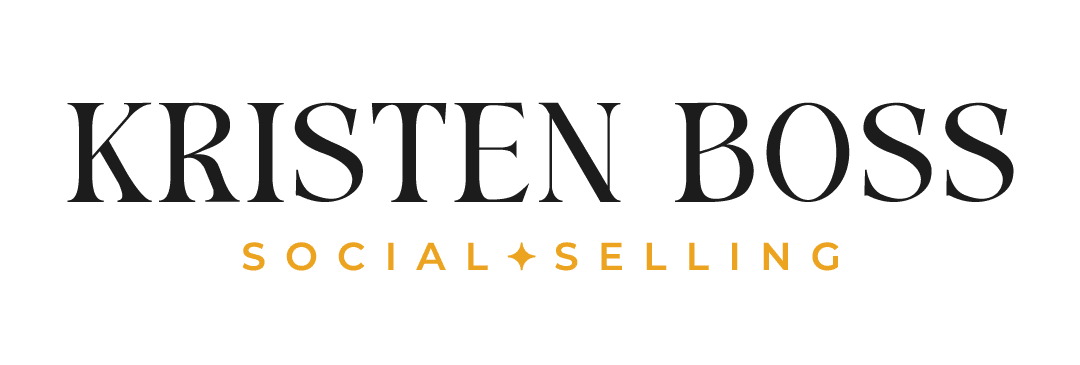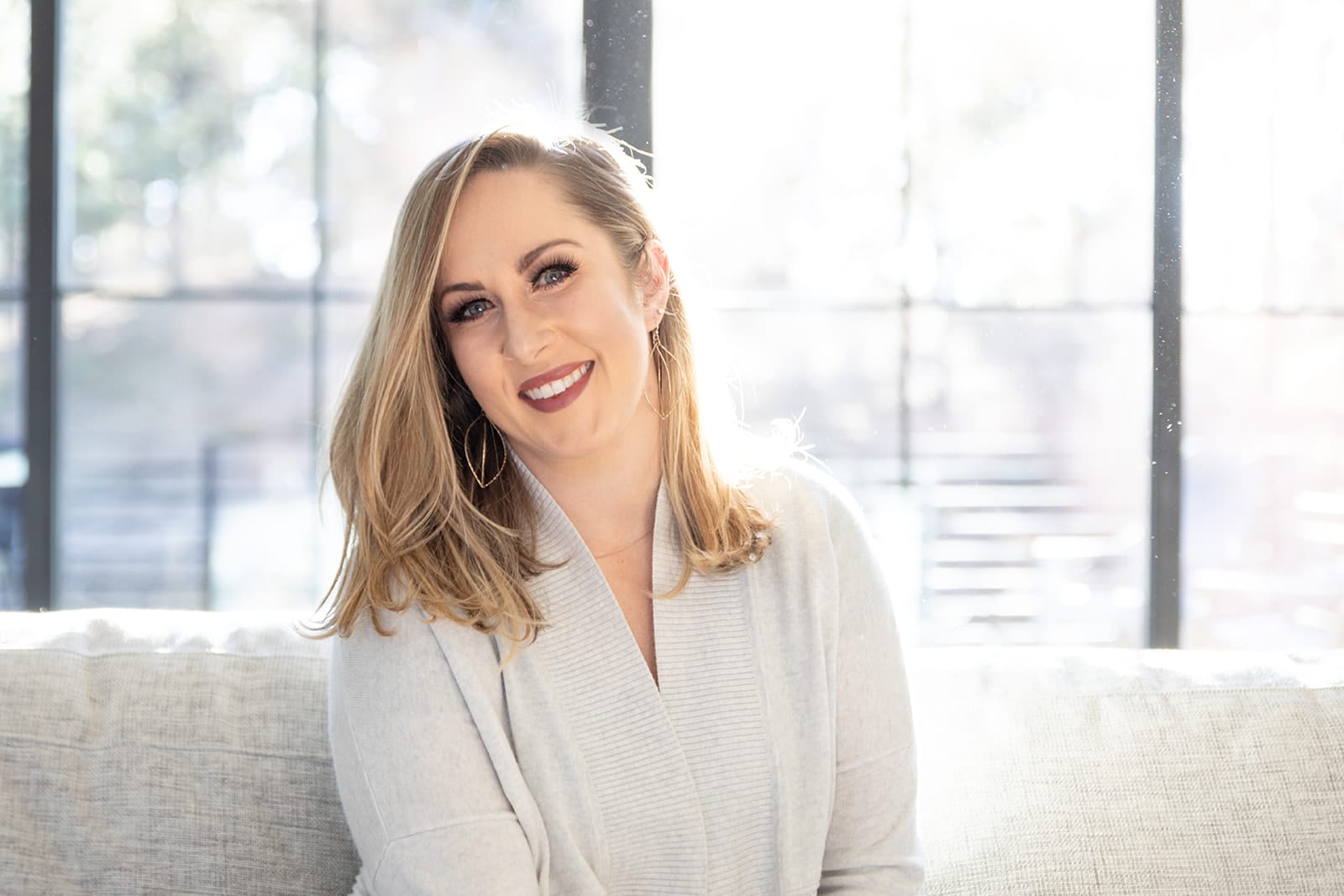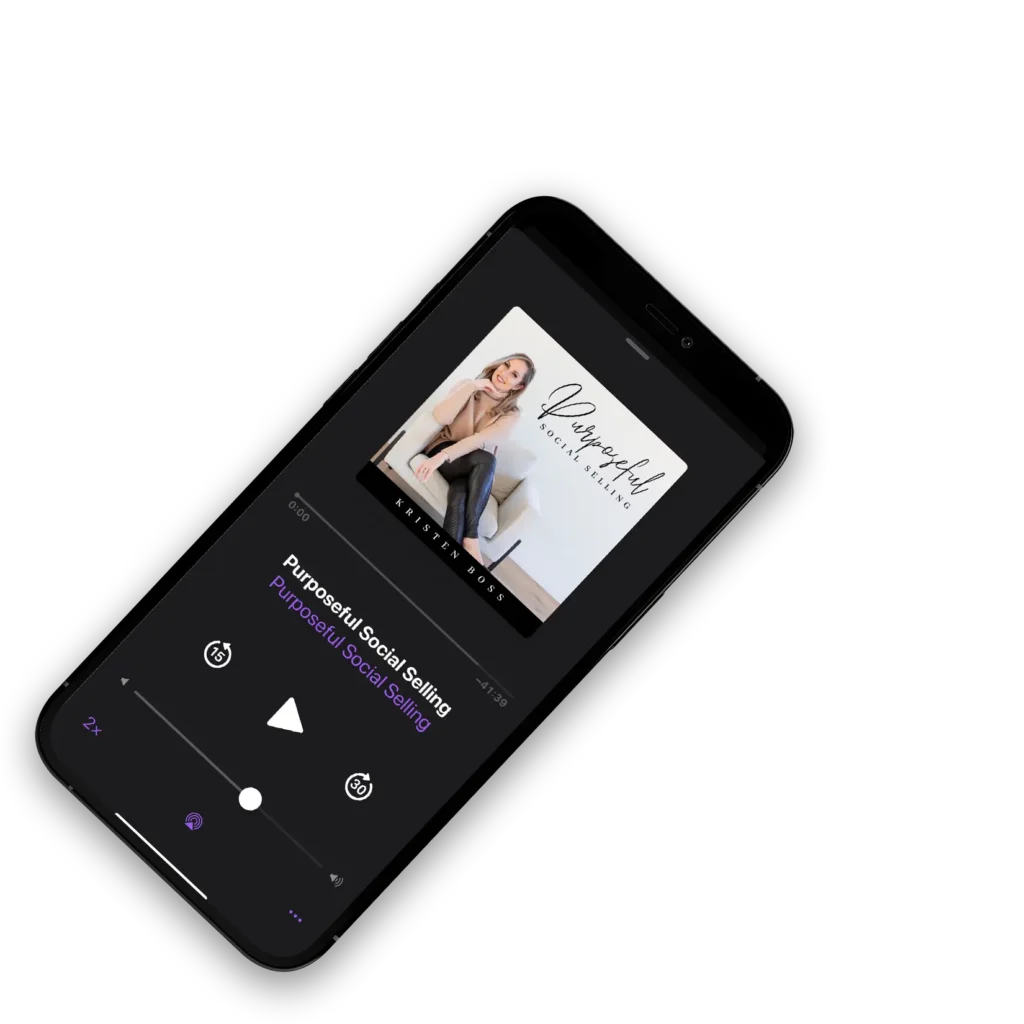Today’s episode on the difference between marketing and manipulation is probably going to rock the boat and it may trigger some of you. But let it. This is a powerful conversation about how each of us is showing up in the online space to sell our product and/or service.
Kristen will be covering:
- The difference between powerful marketing and manipulation
- The 3 ways social sellers are failing their audience
- Your story vs your audience’s story–how to find the right balance
- The ruse of authenticity and vulnerability
- The 2 misuses of vulnerability
- How to make sure you’re NOT manipulating your audience
And so much more! Kristen is bringing ALL THE FIRE today because she’s on a mission to bring awareness and help social sellers show up with more power in their marketing–the right way!
Thanks for listening! Do you have a question about network marketing? Kristen can help! Drop your question here, and she just might answer it live on the podcast: https://kristenboss.com/question
Connect with Kristen:
Do you have a business full of customers and almost no builders? You’re in need of a reboot! Learn the three skills you can learn that will completely change your recruitment game. Check it out here.
If you’re ready to learn the simple process of running your social selling business online, you have to check out Kristen’s live group coaching program! The Social Selling Academy: www.thesocialsellingacademy.com
Interested in Kristen’s exclusive mastermind for six-figure earners in the network marketing industry? Get all the details and join the waitlist here.
Transcript of Episode #8: Marketing vs. Manipulation
Kristen Boss (00:05):
Welcome to Purposeful Social Selling with Kristen Boss. I’m your host, Kristen Boss. I’m a mindset and business coach with more than 15 years experience in both the product and service based industry. I believe that social selling is the best business model for people wanting to make an impact while they make serious income. This is the podcast for the social seller, who is tired of feeling inauthentic in their business and desires to find a more purposeful and profitable way of growing their business in today’s social media landscape. In this podcast, you will learn what it takes to grow a sustainable business through impactful and social marketing. It’s time to ditch the hustle and lead from the heart. Let me show you the new way. Hello friends, and welcome back to another week. Yay. So glad you’re here. Hey, I hope you have been loving the episodes so far. I would love reviews,
Kristen Boss (01:02):
Your feedback on what is serving you. And it is again, just a deep joy to really speak to you and give you value each week. Something that you can take with you to your businesses as you seek to serve people in an authentic and meaningful way in the online space. Speaking of authentic, you know, it’s interesting because part of this podcast name is authentic social selling, and I’ve been thinking a lot about authenticity in the world of social media, in the world of social selling. And I have to be honest with you, this episode, I have been sitting on and pondering for a good 11 days of just wrapping my mind around it and wanting to present it very thoughtfully, respectfully, and carefully. But I really believe this is a necessary conversation we need to be having, especially as people who are using our social platforms as a way to share and sell a product or service. I think we need to be really aware around this conversation and it’s a necessary conversation.
Kristen Boss (02:28):
So my goal in this episode is not to make you feel bad or shame you. I want this to be a really empowering episode, but I realize, I think it might be triggering for a few people. And I’m willing to go there because I really believe the integrity of selling and the online space relies on this conversation. And I’m not sure if people are having this conversation, I’m having it privately with friends and my clients, but I’m not sure who’s really having this conversation. So I’m stepping into it. So today it’s all about the concept of marketing versus manipulation. And how to know the difference as a consumer and a seller and not just a consumer, but I also want to also do this lens as a follower, as someone who follows social media influencers, and for you to be aware when influencers are manipulating, when they are wielding their platform, to get you to think, act and feel in a way that only serves the influencer.
Kristen Boss (03:46):
And we’re going to get to that, we’re going to get to what’s the difference, how to spot the difference. What’s the heart behind each. But my goal is to create a space for this necessary conversation and not only that, but to bring awareness, to educate and empower you so that you can show up more strongly and with true authenticity in the online space. So here we go. So the whole reason why I decided to tackle this subject is I have to say, I have been quite alarmed and shocked lately with some things I’m seeing in the online social selling space. With coaches, network marketers, affiliates, authors, big influencers, big names. I’m noticing this trend in this pattern and the reason why this needs to be addressed. The reason why we need to talk about this is because we need to bring integrity back to the online social selling world.
Kristen Boss (04:53):
And people are being wounded by people who are not responsibly using their platforms in a way that serves people. And it’s so funny. I realized, I know I’m, I’m, I’m entering this conversation knowing that I’m probably putting myself in the limelight, I’m opening myself up for criticism. And yeah, that feels quite vulnerable if I’m being honest with you, but I deeply desire to have integrity in the online space. And I desire for you to show up in integrity. And I believe that this industry needs some help. People are being hurt. This is why people have a really poor taste in their mouth with people who sell products or services online. This is why people have a poor taste in their mouth: because they are tired of feeling manipulated, feeling seen as a number, feeling seen as a sale and not being seen as a person, a human with their own thoughts and feelings and their own stories.
Kristen Boss (05:56):
So again, my mission of this is to bring awareness to what I see happening help you feel confident as a consumer, a follower, and a seller; help you sell with integrity and help you have a really clear see really clear difference between the two so that you can show up confidently in your marketing. Because I really do have amazing people in my community and clients I serve where they’re genuinely afraid of manipulating. They don’t want to manipulate, but they want to market. So they get caught up in this dialogue in their mind of, well, okay, am I manipulating? Or am I marketing what’s going on? So I’m going to make it extremely clear so that you can confidently show up in the online social selling space and know that you are serving. Marketing is a form of serving. I really want to enrich in this industry to be one of integrity, honesty and fulfillment fulfillment means we deliver on what we are selling.
Kristen Boss (06:56):
We follow through on what we are promising are our customers and our consumers. So what I’m seeing, here’s what I’ve been seeing. I’ve been seeing people make these really grandiose claims that they can’t back up. And this is starting to trend in the coaching world. I’m seeing this with coaches. It seems like every coach is making these really extraordinary claims on how they can help people. And they can’t back it up. And then I’m, I’m hearing this, and I know this because I’m getting on calls with potential new clients. And they’re telling me these truly nightmarish stories of these gurus going around as coaches, making these really big promises and not delivering on the service and things being, I mean, I’ve just been appalled. I have been so appalled with how some people have been treated. And I have been so fortunate to be mentored and coached by people of really high integrity– people that value the fulfillment of the service they sold me.
Kristen Boss (08:01):
And because of that, because that’s been my only coaching experience, I was kind of blind to the fact that there are coaches out there that do not operate this way. And it blew my mind, but I I’m finding this. So I’m seeing that with coaches, like really huge claims and I see social sellers, grossly exaggerating the success rate and not being fully forthcoming of what it actually takes to be successful in that industry. That is so important. And I want to be really clear and makes sure that you all know I’m not generalizing here. I’m saying I’m seeing some, not all some people, but you have to understand that some people make a lot of people look bad. So I just want to make sure you as my listener myself, as someone who’s showing up in this industry, that none of us are guilty of this, right?
Kristen Boss (09:02):
You’re here listening to this because we’re elevating the experience for both the buyer, the seller we’re making this a great industry. That’s my mission. Okay. The other thing I’m seeing is a posting style and social media that is made to manipulate an audience. And I’m going to get there and tell you exactly what that looks like, but I’m seeing a certain type of posting that’s made to yeah. Sway, manipulate, control their followers. The other thing I’m seeing last thing that I’m seeing there’s a lot, but these are the big ones I’m seeing is inauthentic and curated connections made to look organic, but they’re not. Because what happens is there is an attempt to immediately convert the conversation to a sale. It’s like they hijack the conversation. It starts, it seems authentic. It seems sweet. And then boom, they come in and switch it up and they’re getting you in for a sale.
Kristen Boss (10:07):
I literally had someone tell me, who’s a coach that someone booked a, like a clarity call with her. So this, this client was excited to get on a call with this potential new person. And the new person was actually a coach and hijacked the call and ended up trying to sell, the other person on her services and started to shame her on like, well, you’re not doing a good sales call. You need to be working with me. I was like, how is this? Okay, how is this? Okay, where are we hijacking conversations? Why are we doing this? This is not okay, but it’s happening. And this is why people don’t have trust. I know we want…it’s so funny because the factors that you absolutely need with your online platform is the like know trust, factor, and trust–now more than ever is becoming quite scarce. Because I see a lot of people that will get their audience to feel like they know them and like them. And then there’s an abuse of trust.
Kristen Boss (11:21):
I see that a lot. Okay. So what’s the difference between marketing versus manipulation? And the two principles I have between them is one is based on empathy. And the other one is based on extraction. Marketing, I heard this from best-selling author, Jeff Goins at a mastermind retreat. I was at he has a great, his several great books look him up, but he said marketing as a form of radical empathy. And that, that sat deeply with me in my soul. I was like, yes, that makes sense. Of course, marketing is me deeply empathizing and understanding my audience within their own stories within their own problems. Marketing is when we seek to deeply understand someone’s pain and we seek, seek deeply to understand what it is they want. And then we work to put a solution in front of them that is effective and powerful marketing is sitting and understanding how can, how can I really meet someone where they’re at that’s marketing?
Kristen Boss (12:34):
How can I really meet someone where they’re at? How can I meet my audience with w with where they’re at? How can I deeply empathize with what they’re thinking and feeling in relation to their own story? Not mine, powerful marketing is when we seek to deeply understand the story our audience has, instead of making our story the most important, like I get it. Our story is really inspirational. And I will tell stories when appropriate to help inspire my audience, to realize what’s possible for them, but I’m not posting every day being like me, my I, this I’m always talking to my I’m like 90% of the time I’m talking to my audience and what they’re thinking and what they’re feeling. And I’m entering into their stories with my content in a way that lets them know, like I see you. I know what your thoughts are. I know what’s holding you back and I’d love to help you. That is powerful marketing. That’s powerful copywriting. I’m giving you some serious like copywriting secrets, are you taking notes? So good. Okay.
Kristen Boss (13:45):
A question to ask yourself when it comes to marketing versus manipulation, is, are you telling your stories, is your storytelling, is it to help the client or the audience heal their own story? Or are you looking for healing in your own story, through the reaction of your audience? Are you hoping to heal your story through the reactions and feedback from your audience? Let me tell you something that is dangerous for you, because if you are seeking to heal your story through your audience, you are setting yourself up for being deeply hurt and disappointed. You are responsible for your healing. We have to be so careful that we’re not seeking to find all of our validation from what our audience thinks of us. And I know that’s hard. Trust me. I have days. I totally have days. You’re not alone in that. But marketing is when we stop fixating on our stories. And we really think about the story. Our audience has the story. Our client has. Our potential has. And entering there and speaking life and truth and offering a solution to her problem and being completely detached from what they decide to do with that offer.
Kristen Boss (15:16):
That’s powerful. Marketing is being completely detached from what someone decides to do with your offer. Manipulation. Are you ready for, this? Is when you are extracting, when you are looking to extract an outcome based on how you wield your words. Now I get this like, now hear me: marketing. You’re still speaking like powerful copywriting. You’re still using your words to extract outcome. But one is in the name of heartfelt service. One outcome is truly in the name of heartfelt service. The other is in the name of selfish gain and securing an outcome to meet your own needs instead of your audience’s needs. So, and it goes so far as to say, manipulation is when you are extracting an outcome from your reader in order to serve your own needs.
Kristen Boss (16:22):
And when you are manipulating, that means you are completely fixating on guaranteeing the outcome that you want to have. There’s a lot of attachment and manipulation because you are there with an end goal in mind, and you’re going to make them think and feel and act a certain way until you get them to the end goal. That’s, that’s pretty intense. So how are people doing this? Like what does manipulation actually look like if you’re like, oh, shoot, like what I do that with my selling, like, especially with us as coaches, our job is to help people overcome their own objections, overcome the thoughts that keep them from getting the outcome, what they want, the thoughts that keep them from making investments in themselves. So what’s different between me helping someone overcome their objections and me manipulating somebody, helping someone overcome their objections, always about helping someone get to the answer they want, helping the audience member, like letting them get to the outcome they want for themselves and helping them get there in a way that they’re happy with. Even if the outcome doesn’t serve you as a coach or a marketer or a seller, right. When we are serving really well, we’re focused on the outcome, being the benefit of our client, our potential, our buyer, instead of the outcome solely benefiting us. Even if that outcome is a no for us, even if it means, they say no to us, if it still is a benefit or a serves our client, our audience member, our potential, then we’ve done well.
Kristen Boss (18:08):
So are people manipulating all this is going to be get ready. Okay. People are manipulating under the ruse…they’re creating a ruse of authenticity and vulnerability. And I realized that’s really heavy because right now our culture is like, I feel like everybody throws around authenticity and vulnerability. Like it’s a trend or like we really value it. So much so that I see almost people trying to overcompensate in their social media and sharing way too much, going over the top. And we’re going to talk about that. But it’s the ruse of authenticity and vulnerability. I’m going to even call it a curated authenticity. So I’m going to be incredibly selective over the things I’m going to let you see in a way that still casts me in a light that you like about me. That’s not, that’s actually not being vulnerable because vulnerability means you are putting yourself in a place where there is emotional exposure, uncertainty, and risk. That is a definition from Brene Brown in her book, Daring Greatly.
Kristen Boss (19:26):
So if you are curating your authenticity in order to secure how they view that authenticity and how they view that vulnerability, that’s not true vulnerability because there is no uncertainty risk or emotional exposure because you are, you are creating like you’re, you’re being an architect of the situation. You’re still in control when you’re vulnerable. There is no control. Vulnerability is literally a loss of control. It means that you don’t have control of the outcome. I know that’s really big. I’m seeing really kind of disturbing things right now because when I was sitting with this, it was kind of blowing my own mind. So, it’s okay to feel uncomfortable. I think we’re all like, oh, woo. Okay. So what I see being done is creating the ruse of authenticity and vulnerability in order to create trust or quicken intimacy with our audience. In the book, daring greatly, Brene Brown. She says in today’s world, it’s becoming more and more exceedingly difficult to determine what is a real attempt to connect and what is a performance? My mind melted. When I read that it’s becoming more and more difficult to determine what’s a real attempt to connect and what is performance?
Kristen Boss (20:59):
So how are people curating this ruse of authenticity and vulnerability? So one of them, Brene Brown in the, in this book, she talks about there’s two types of using vulnerability as, as armor, like misusing vulnerability. So one is the misuse of it and she calls it, “Floodlighting.” It’s where you share way too much, way too soon in an effort to find your healing through the response that you get from your audience or your listener. It’s typically when it’s too much, too soon, it’s typically a story you haven’t really fully worked on to heal yourself. It’s just, it’s still, you know, there’s this thought of “share scars, not scabs.” I tell this with my clients, I’m like, share your scar is not your scabs. If it’s still, if it’s freshly healed now might not be the time to share the story, share it when there’s a little more distance when you’ve done some healing yourself so that you’re not seeking validation for your healing through your audience.
Kristen Boss (22:05):
So she calls that one floodlighting, and it actually breaks trust because it feels weird to your audience. It’s like, oh God, too much too soon. And, and honestly the listener looks at that and they, and they feel the inauthenticity in that one. They’re like, okay, what are you, what are you trying to do? So I see that one a lot. And then, so she calls that one: that’s the misuse of vulnerability. And then she has one where it’s wielding vulnerability as a weapon hall. So I’ll just get intense in here. Are you sweating? All right. She calls this the smash and grab tactic. And it’s when someone shares beyond the normal boundaries of trust-building in order to capitalize on the energy and response of the reaction, it’s creating sensationalism. This smash and grab tactic is to make the audience feel a certain way so that they can extract an outcome by extorting the feelings: that’s the smash and grab.
Kristen Boss (23:05):
So I’m like shock you. And then I’m going to, I’m going to get all this it’s sensationalism. I’m gonna, I’m gonna build hype around this response. And then I’m going to capitalize it on a way that I profit from. That is “smash and grab” where I’m going to shock you. You don’t know what to do. There’s a lot of thoughts and feelings, and I’m going to move on it. Manipulation is when you are taking the power away from your audience and you hold all of it. I find manipulation is when I see people using tactics to gain trust, make the audience feel a certain way, extort the feelings. And I often find manipulation is shame inducing with the audience, making them feel small, or bringing them to a place where they, their guard is down emotionally. And then taking advantage of that. Whereas marketing is when you completely release the outcome and you’re trusting the efforts of your ability to deeply understand and empathize with your audience.
Kristen Boss (24:13):
You’re not looking for your healing through them. You’ve done your healing, you’re sharing so that they can have their healing. You’re focused on healing, your audience, not you, you’re focused on solving their problems, not yours. And when you are marketing well, you’re getting your audience to a place of empowerment. Personally, I do not want someone coming to me because I’ve shamed them into wanting a coach. Like you suck in your business, you’d be here. You know, if you, if you worked with me here, then you’d be here by now. Like I’m really firm and confident in my copywriting, but I also do it with empathy and compassion because I deeply understand and have been in my audience shoes before I do it from a place of deep love. And, and that is your self check. You must do self checks and be like, where is this coming from? Am I seeking to gratify self or my looking to lift up others? Am I seeking to, you know, pad my bank account? Or am I seeking to love someone and help them have healing in their own life? I want someone empowered to purchase, not shamed. I want someone to say yes from a place of empowerment, joy, and self-trust not a place of shame and feeling like they suck. And I see coaches do this. I see influencers do this. It’s bullying. And it’s narcissism.
Kristen Boss (25:49):
I’m using really strong, words. But, I’m calling it like I see it because this industry desperately needs servant hearted people that serve from integrity, that serve from honesty, that share stories in an effort to bring healing to others and not themselves. That share stories totally detached from the outcome they get from sharing the stories and trusting that it’s going to come back to them in some way. Vulnerability and authenticity are things to be, not use. Vulnerability and authenticity are not meant to be weaponized in order to, to rapidly gain trust and get blind followers that do whatever you say and want. And I see this and it gets me so fired up because that’s not, it’s not, if you’re manipulating a form, manipulation is when you know, Brene Brown talks about this. It’s kind of going back to the smash and grab tactic, but it’s when there’s this sharing of an intimate story for the shock and awe value.
Kristen Boss (27:05):
I see this, the shock and aw. And it’s to Hotwire a connection with somebody through authenticity and swoop in, and an opportune moment that you created. It’s literally like, I’m gonna tell the story and get everybody to feel this way. And then I’m gonna, I’m going to swoop in, like, everyone’s going to love this, feel this, and I’m going to swoop in and, and profit off of this. I barely wrote in my notes, sister, check yo self, check yourself. So how do you know, how do you know you’re coming from the right place? Whose outcome are you more fixated on your clients or yours, whose transformation do you care more deeply about your clients are yours? Are you attached to the outcome? Are you doing a post too shocking?
Kristen Boss (27:58):
Are you doing something to gain attention to yourself in order to profit from it in a way that only serves you and not your audience? And here’s how you know, it’s self-serving and not truly in your clients or your audience, best interest when you fail to fulfill on what you sell, when you get them in, you sell them. And it’s goodbye, misused and abused. Someone who is marketing well comes from a place of deep empathy. They’re detached from the outcome. They’re trusting that when someone’s ready to buy, it’s going to be from a place of empowerment. They’re going to come to them and they’re going to care deeply about fulfilling on what they have promised that customer. We need to be those people. We need to be people that value fulfillment just as much as we value you are selling like, you know, yes, selling is what brings in people, but you have to value fulfilling on your selling, just as much are your customers getting the results that you promised to them?
Kristen Boss (29:01):
Why not? Are you, have you taken full ownership of your part of the equation and their success? Like there’s two people for success, you and them have you done your part? And I realized there’s they need to do their part as well. I get that. So what are some self-checks to have in place? Are you using the post to seek attention and find validation through your audience? Are you hoping to get an outcome that only works in your favor through this? When you’re looking to share a story, have you personally worked through and healed the story on your own before you seek healing through your audience? Now hear me on this. I do believe storytelling is deeply powerful and I believe it’s also deeply healing. So I think there’s a fine line with, yes, we can share and, and heal in our sharing. I’m not telling you to not tell your story.
Kristen Boss (30:03):
Don’t hear that that’s so important, but you know, in your heart, what the motivation is of your storytelling, right? There was a season to give an example. There was a season where I was going through. I had a lot of miscarriages and I was really heartbroken and I was really fragile and life was really hard. And I shared about it in a, I think I wrote a blog and I wrote a couple of Facebook posts and I shared about it. My only goal in sharing was I wanted other women who are suffering in silence to know that they were seen too. I wanted them to know that I would be there to talk about it. If they needed someone I wanted to, this was five years ago. And it’s talked about a lot more now than it was then, but I wanted to break the silence to give someone else permission to heal.
Kristen Boss (31:07):
So my outcome was yes, there was healing for me in telling my story, but I also knew I could bring healing to somebody else. And I had no other alternative motive or outcome there. So your story matters. Just use your story responsibly, use it to love people and serve people, not use people to further your own gain, to justify a means to an end that only serves yourself as a consumer, as a follower, as someone who watches, influencers and watches other people just asking, like, what is the seller promising? And is it reasonable? Do they have testimonials? Do they deliver, what do people say about them? Do you feel shamed or small into your decision-making with this person? Do you feel less than when you read their content or do you feel really empowered around them? Do you feel empowered in your decision-making? How do you feel engaging in their platform?
Kristen Boss (32:11):
Do they make you feel capable or did they make you feel weak and you’ll know in that moment, but this is when we have to do heart checks and use our social platforms responsibly. We can mark it really powerfully and really speak to people’s problems and present them with solutions. That is the beauty of being an entrepreneur is really seeking to love and serve and deliver solutions to our audience, not to turn our audience into blind sheep that do whatever we say. Like I never want to abuse trust of my audience. And I see that happening everywhere. And I’m feeling a little fiery about it because that’s a misuse of a social media platform. And I’m not going to sit here and tell you I’m perfect at it. I’m still doing my part, working on it, using it responsibly, being a good example of strong marketing, strong, confident marketing that empowers my ideal clients and my audience to benefit from it, whether they pay for my services or not, whether they hire me or not.
Kristen Boss (33:25):
My goal with my content is for somebody to feel inspired and take action and have a win in their life. I love I’ve been getting messages on Facebook from people that have closed sales and had their best months because they listened to a podcast episode, the success thoughts, one, I’m getting the most feedback on like, oh, I tried this thought and this thought, and I totally had a killer month. I did this thought and this thought, and I closed my biggest sale yet. I love that. I want that for you. If you never hire me, if we never meet, I want you to feel so empowered and I want radical change for your life. That is meaningful to me. That’s marketing. My podcast is a form of marketing and I love it because I love speaking to you. I love serving you love giving you value, but I wanted to have a conversation around what I’m seeing and what we can do differently and how we can market responsibly. Ooh, that should be a, t-shirt like responsible marketer I’m market responsibly. So I think now that you have these indicators to look for, I’ll be very curious to see how you engage in your social media platforms and what you consume and what you say. But I believe when we market well from a place of empathy, from a place of service.
Kristen Boss (34:55):
We’re going to elevate the industry and make it more beautiful, more trustworthy, more honest, and filled with integrity, Amanda, that I just brought you all to church. We will catch you guys next week. That wraps up today’s episode. Hey, if you love today’s show, I would love for you to take a minute and give a rating with the review. If you desire to elevate the social selling industry, that means we need more people listening to this message so that they can know it can be done at different way. And if you’re ready to join me, it’s time for you to step into the Social Selling Academy, where I give you all the tools, training, and support to help you realize your goals in the academy. You get weekly live coaching so that you are never lost or stuck in confusion. Whether you are new in the business or been in the industry for awhile. This is the premier coaching program for the modern network marketer go to www.thesocialsellingacademy.com to learn more.










